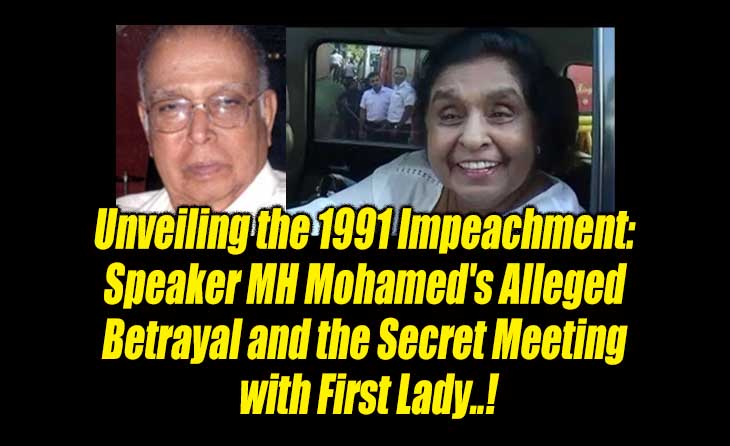-By A Special Correspondent

(Lanka-e-News -10.Jan.2024, 10.45 PM) In the annals of Sri Lankan political history, the year 1991 stands out as a time of turbulence and political intrigue. The impeachment proceedings against President Ranasinghe Premadasa, orchestrated by former Prime Minister Sirimavo Bandaranaike and supported by internal rivals Lalith Athulathmudali and Gamini Dissanayake, took a surprising turn with allegations of betrayal and a secret meeting involving the Speaker of the House, M.H. Mohamed.
As the nation reflects on these historic events, there is a growing demand for a comprehensive investigation into the allegations surrounding Speaker MH Mohamed. The question on everyone's mind: Was Speaker Mohamed swayed by financial incentives orchestrated by former First Lady Mrs. Premadasa? The Sri Lankan Parliament must appoint a select committee to unravel the truth behind these explosive claims.
In September 1991, President Premadasa found himself in the crosshairs of an impeachment motion, masterminded by Sirimavo Bandaranaike and backed by formidable rivals from within his own political party. Lalith Athulathmudali and Gamini Dissanayake, both of whom would eventually meet tragic fates at the hands of the LTTE, were among those leading the charge.
Surprisingly, Speaker M.H. Mohamed, initially suspected of aligning with the impeachment move, found himself in the spotlight. Armed with an impeachment motion signed by around 140 MPs, the conspirators believed they had the momentum. However, President Premadasa, with the support of key ministers including Ranil Wickremesinghe, Sirisena Cooray, and Weerasinghe Mallimarachchi, swiftly nipped the impeachment attempt in the bud.
In the aftermath of the failed impeachment, startling revelations emerged about Speaker MH Mohamed. Serving as the Minister of Muslim Affairs since 1979, Mohamed had reportedly amassed a considerable fortune through various Islamic charities. Shockingly, a significant portion of these funds was diverted for personal gain, including the importation of a vehicle from India. More damning was the allegation that Speaker Mohamed had engaged in a secret meeting with the former First Lady, Mrs. Premadasa, where a financial deal was struck to switch allegiances.
The Constitution of Sri Lanka played a crucial role in shaping the trajectory of these events. Article 38(1) mandated that an impeachment motion must garner support from at least two-thirds of the Members of the House. Article 70(1)c further specified that once such a motion reached the President, he could not dissolve Parliament. Faced with this challenge, President Premadasa exercised his right to prorogue Parliament, legally re-summoning it on September 24.
The preparation and drafting of the impeachment motion became one of the most closely guarded secrets in the history of Sri Lankan parliamentary affairs. The shroud of secrecy surrounding the motion left even seasoned parliamentarians in the dark. Comparisons were drawn to historical events, such as the clandestine crossover of 17 government MPs led by C.P. de Silva, which had toppled the Sirima Bandaranaike government.
In the midst of the unfolding drama, Speaker Mohamed and a few MPs received an invitation from the Inter Parliamentary Union to attend a conference in Delhi. However, their departure was delayed due to the lack of permission from the President. Eventually granted permission, Speaker Mohamed was advised to remain tight-lipped about the impeachment matter during their stay in Delhi. Meanwhile, back home, members were growing increasingly perturbed about the sudden prorogation.
As Parliament reconvened on September 24, President Premadasa addressed the impeachment issue in his opening speech. He vehemently asserted his innocence, highlighting the lack of established misconduct on his part. Behind the scenes, ministers like Lalith Athulathmudali and Gamini Dissanayake, along with Speaker Mohamed, were rumored to possess copies of the motion, collecting signatures surreptitiously.
The day after, on September 25, Speaker Mohamed made a crucial statement at the commencement of proceedings. He revealed having received notice of a resolution under Article 38(2) of the Constitution. Despite initially entertaining the motion, he acknowledged subsequent concerns about the validity of signatures and pledged to investigate. Time passed, and President Premadasa, convinced of Speaker Mohamed's involvement, took steps to confront him. Allegations even extended to advising a foreign dignitary against supporting the Speaker's projects.
In a surprising turn of events, Speaker Mohamed summoned a trusted aide to discuss the contentious motion. There, he revealed his suspicions that some signatures on the motion were not genuine and were, in fact, forgeries. The aide, recalling the moment, suggested that if the Speaker had sought assistance when accepting the motion initially, they could have verified the signatures against the official volume maintained for members' oaths. The Speaker, smilingly, instructed the aide to draft a letter to the President, declaring the motion unacceptable due to insufficient valid signatures as per constitutional requirements.
Finally, on October 8, 1991, as the House convened, Speaker Mohamed made a historic statement. He declared, "Further to the announcement made by me to the House on Sept. 25, 1991, regarding the notice of a resolution under Article 38(2) of the Constitution, I wish to inform the House that having inquired into the matter, I am now of the view that the resolution does not have the required number of valid signatures, and therefore it cannot be proceeded with." With these words, the saga of the impeachment motion came to a dramatic and unceremonious end.
As Sri Lanka reflects on the events of 1991, the nation stands at a crossroads. The call for a select committee to investigate the allegations surrounding Speaker MH Mohamed grows louder. The intricacies of the impeachment saga, with its clandestine meetings, alleged betrayals, and constitutional maneuvers, highlight the complexity of political machinations. The demand for transparency and accountability echoes through time, urging authorities to unravel the truth behind one of the most tumultuous periods in the country's political history.
---------------------------
by (2024-01-10 17:44:58)
Leave a Reply